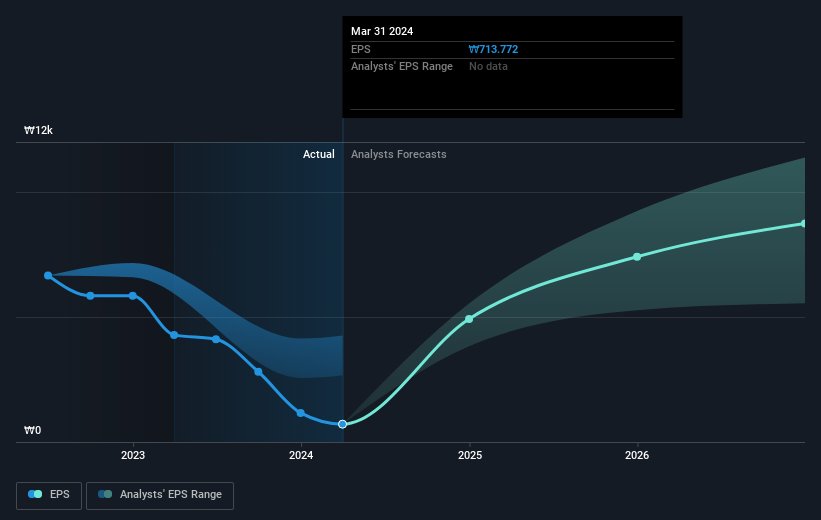- South Korea
- /
- Chemicals
- /
- KOSE:A120110
Kolon Industries (KRX:120110) stock falls 8.8% in past week as three-year earnings and shareholder returns continue downward trend

Investing in stocks inevitably means buying into some companies that perform poorly. But the last three years have been particularly tough on longer term Kolon Industries, Inc. (KRX:120110) shareholders. So they might be feeling emotional about the 57% share price collapse, in that time. The more recent news is of little comfort, with the share price down 37% in a year. The falls have accelerated recently, with the share price down 16% in the last three months. Of course, this share price action may well have been influenced by the 6.7% decline in the broader market, throughout the period.
With the stock having lost 8.8% in the past week, it's worth taking a look at business performance and seeing if there's any red flags.
See our latest analysis for Kolon Industries
While markets are a powerful pricing mechanism, share prices reflect investor sentiment, not just underlying business performance. One imperfect but simple way to consider how the market perception of a company has shifted is to compare the change in the earnings per share (EPS) with the share price movement.
During the three years that the share price fell, Kolon Industries' earnings per share (EPS) dropped by 40% each year. In comparison the 25% compound annual share price decline isn't as bad as the EPS drop-off. This suggests that the market retains some optimism around long term earnings stability, despite past EPS declines. This positive sentiment is also reflected in the generous P/E ratio of 47.42.
You can see below how EPS has changed over time (discover the exact values by clicking on the image).

This free interactive report on Kolon Industries' earnings, revenue and cash flow is a great place to start, if you want to investigate the stock further.
What About Dividends?
It is important to consider the total shareholder return, as well as the share price return, for any given stock. The TSR is a return calculation that accounts for the value of cash dividends (assuming that any dividend received was reinvested) and the calculated value of any discounted capital raisings and spin-offs. It's fair to say that the TSR gives a more complete picture for stocks that pay a dividend. As it happens, Kolon Industries' TSR for the last 3 years was -54%, which exceeds the share price return mentioned earlier. This is largely a result of its dividend payments!
A Different Perspective
While the broader market lost about 1.9% in the twelve months, Kolon Industries shareholders did even worse, losing 35% (even including dividends). Having said that, it's inevitable that some stocks will be oversold in a falling market. The key is to keep your eyes on the fundamental developments. Unfortunately, last year's performance may indicate unresolved challenges, given that it was worse than the annualised loss of 0.9% over the last half decade. We realise that Baron Rothschild has said investors should "buy when there is blood on the streets", but we caution that investors should first be sure they are buying a high quality business. While it is well worth considering the different impacts that market conditions can have on the share price, there are other factors that are even more important. For instance, we've identified 4 warning signs for Kolon Industries (1 makes us a bit uncomfortable) that you should be aware of.
If you like to buy stocks alongside management, then you might just love this free list of companies. (Hint: many of them are unnoticed AND have attractive valuation).
Please note, the market returns quoted in this article reflect the market weighted average returns of stocks that currently trade on South Korean exchanges.
Valuation is complex, but we're here to simplify it.
Discover if Kolon Industries might be undervalued or overvalued with our detailed analysis, featuring fair value estimates, potential risks, dividends, insider trades, and its financial condition.
Access Free AnalysisHave feedback on this article? Concerned about the content? Get in touch with us directly. Alternatively, email editorial-team (at) simplywallst.com.
This article by Simply Wall St is general in nature. We provide commentary based on historical data and analyst forecasts only using an unbiased methodology and our articles are not intended to be financial advice. It does not constitute a recommendation to buy or sell any stock, and does not take account of your objectives, or your financial situation. We aim to bring you long-term focused analysis driven by fundamental data. Note that our analysis may not factor in the latest price-sensitive company announcements or qualitative material. Simply Wall St has no position in any stocks mentioned.
About KOSE:A120110
Kolon Industries
Engages in industrial materials, chemicals, films/electronic materials, and fashion businesses in South Korea and internationally.
Established dividend payer slight.

